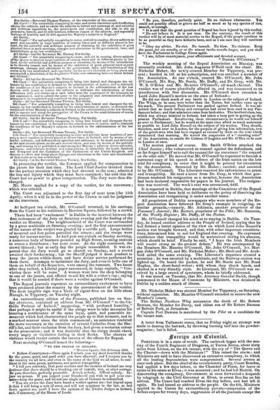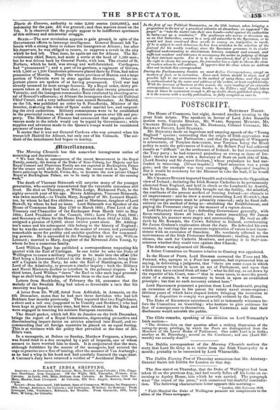,foreign artb Colonial.
PORTUGAL is in a state of revolt. The outbreak began with the mu- tiny of the Fourth Regiment of Dragoons, at Torres Novas, about sixty miles from Lisbon, on the 4th instant, with the cry of "The Queen and the Charter—down with the Ministers !" This raised the alarm ; and Ministers are said to have discovered an extensive conspiracy, in which all the leading Septembrists were compromised. Several arrests at once took place. But the chief of the revolutionary party, Count Bomfim, had applied a few days before, to the Chamber of Peers, for leave to retire to his estate at Elves; it was accorded ; and he had left Madrid. On discovering the conspiracy, Government at once forwarded a despatch by telegraph to the Civil Governor at Elves, to arrest Bonefim on his arrival. The Count had reached Elves the day before, and had left it again. He had issued an address to the people. On the 6th, Ministers applied to the Cones for extraordinary powers—suspension of the habeas corpus for twenty days, suppression of all the journals except the Diario do Governo, authority to raise 2,000 contos (450,0000, and indeMnity for the past. All was granted ; and thus matters stood on the 7th. h is observed that the people appear to be indifferent spectators of this military and ministerial struggle.
SPAIN.—The new revolution appears to gain ground, in spite of the Government efforts to intercept intelligence. General Roncali left Va- lencia with a strong force to reduce the insurgents at Alicant ; but after his departure, he was obliged to return, to suppress a revolt in the city which he had left. That done, he again set out for Alicant. The Re- volutionary chief, Bonet, had made a sortie at the head of 1,500 men ; but he was driven back by General Pardo, with loss. The citadel of St. Barbara, which he held, was strong and well-furnished. Carthagena had " pronounced " ; and a part of its garrison, a regiment of Girona, with 1,000 or 1,200 Catalonian prisoners placed there by Prim, had taken possession of Murcia. Nearly the whole province of Murcia and a large portion of Valencia were in arms against Government. Other im- portant places are spoken of as having pronounced. Civil war had already assumed its most savage features. By a Royal order, thirty pri- soners taken at Alcoy had been shot ; Roncali shot twenty prisoners at Valencia; and the insurgent commander Ruiz retaliated by shooting seve- ral of Roncali's adherents; at Alicant the insurgents shot the old Political Chief Ceruti, and a very influential man named Bernaben. At Madrid, on the 7th, was published an order by S. Penaflorida, Minister of the Interior, declaring the whole of Spain under martial law, and suspend- ing the civil authorities. Military commissions were to be established in the provincial towns, with most extensive powers over life and pro- perty. The Minister of Finance had announced that supplies and ad- vances made to the rebels would not be repaid by Government ; while supplies and advances made to the Queen's troops would be considered payment of taxes due. It seems that it was not General Cordova who was arrested when his troops left Madrid for Alicant, but only one of his Colonels. The sol- diers of the detachment had begun to mutiny.



























 Previous page
Previous page